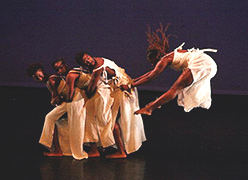Umfundalai: A Contemporary African Dance Technique
September 23, 2013
 Drexel University’s Dance and Africana Studies programs will host a most respected dance scholar and choreographer, Dr. Kariamu Welsh, the creator of the African dance technique Umfundalai, on Oct. 17, 7 p.m. at the Mandell Theater. Dr. Welsh, a Guggenheim Award winner, will tell of how her time living, studying, teaching and performing in Africa inspired her to establish a dance style suited for all body types.
Drexel University’s Dance and Africana Studies programs will host a most respected dance scholar and choreographer, Dr. Kariamu Welsh, the creator of the African dance technique Umfundalai, on Oct. 17, 7 p.m. at the Mandell Theater. Dr. Welsh, a Guggenheim Award winner, will tell of how her time living, studying, teaching and performing in Africa inspired her to establish a dance style suited for all body types.
Pronounced “um-foon-duh-luh”, the Umfundalai technique combines traditional African dance elements with African American-derived rhythms. The names of its movements and structures convey cultural and historical information similarly to ballet and modern, which broadens the technique’s appeal to a wider variety of dancers. During the Mandell Theater’s free and open-to-the-public event, Dr. Welsh will detail the history behind her work and lead dancers from her own company in a demonstration of the Umfundalai technique.
Dr. Kariamu Welsh is the recipient of numerous fellowships, grants and awards, including a National Endowment for the Arts Choreography Fellowship, the Creative Public Service Award of N.Y., a Pew Fellowship, a Simon Guggenheim Fellowship, a Pennsylvania Council on the Arts grant, and three Senior Fulbright Scholar Awards. She is the founding artistic director of the National Dance Company of Zimbabwe in southern Africa. She received her Doctorate of Arts in Dance History from New York University and her MA.H. from the State University of New York at Buffalo. Dr. Welsh serves as the Director of the Institute for African Dance Research and Performance, and is the author of numerous books including: Zimbabwe Dance: Rhythmic Forces, Ancestral Voices and an Aesthetic Analysis and Umfundalai: An African Dance Technique. She is the editor of The African Aesthetic: Keeper of Traditions and African Dance: An Artistic, Historical and Philosophical Inquiry and co-edited African Culture: Rhythms of Unity.